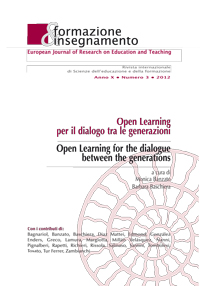Menti Aperte e Apprendimento Aperto nella Rete Cosmopolita
DOI:
https://doi.org/10.7346/-fei-X-03-12_04Parole chiave:
Open Learning, Cosmopolitismo, Tecnologia e Società, Solidarietà intergenerazionale, Coesione socialeAbstract
La tecnologia – internet in particolare – prometteva di azzerare lo scarto generazionale nell’accesso alle informazioni. Tuttavia, nonostante il successo globale dimostratoci dalla rete d’informazioni, è possibile sostenere che esso abbia raggiunto il su opotenziale di veicolo per il superamento del divario tra gli individui “sub-formati” e quelli “sovraqualificati” – cioè quello tra generazioni o tra ogni qualsivoglia divisione sociale lampante nel mondo
analogico? Dovendo porci la domanda schietta se Internet sia o meno uno spazio cosmopolita, la risposta che forniremmo sarebbe probabilmente (e nel migliore dei casi) ambigua. Questo articolo presenta sia una prospettiva longitudinale sul potenziale della Rete come spazio ove avviene l’apprendimento intergenerazionale, sia alcuni potenziali barriere estensive al suo sviluppo in tal senso.
Riferimenti bibliografici
Appiah, K. A. (2006). Cosmopolitanism: Ethics in a World of Strangers. New York: W.W. Norton and Co.
Dewey, J. (1916). Democracy and education: An introduction to the philosophy of education. Macmillan.
Dewey, J. (1933). How we think. Boston: D.C. Heath & Co.
Frehill, L. (2010). Satisfaction: Why do people give up engineering?. Mechanical Engineering Magazine [January 2010]. Retrieved October 3, 2012, from http://memagazine.asme.org/Articles/2010/january/Satisfaction.cfm
Gelernter, D. (1991). Mirror Worlds or: the day software puts the universe in a shoebox how will it happen and what will it mean. Oxford: Oxford University Press.
Heskitt, J. (2007). How will Millenials Manage?. Harvard Business School Working Knowledge. Retrieved October 3, 2012, from http://hbswk.hbs.edu/item/5736.html
Lichtenstein, G., Loshbaugh, H. G., Claar, B., Chen, H. L., Jackson, K., & Sheppard, S. D. (2009). An Engineering Major Does Not (Necessarily) an Engineer Make: Career Decision Making Among Undergraduate Engineering Majors. Journal of Engineering Education, 98(3), 227–234. https://doi.org/10.1002/j.2168-9830.2009.tb01021.x
Mander J. (1977). Four Arguments for the Elimination of Television. New York: Morrow.
Mander J. (1991). In Absence of the Sacred. San Francisco: Sierra Club Books.
Negroponte, N. (1995). Being Digital. New York: Alfred A. Knopf.
O’Toole, F. (2011). Want to hear about a daft idea that deserves to be shelved?. Irish Times, 19 November 2011. Retrieved November 30, 2012, from http://www.irishtimes.com/newspaper/weekend/2011/1119/1224307814661.html (currently available at: https://web.archive.org/web/20111130181646/http://www.irishtimes.com/newspaper/weekend/2011/1119/1224307814661.html)
Sunstein, C. (2002). Republic.com. Princeton: Princeton University Press.
Williams, L. R. T. (2006). Cognition, perception and action: Processes underlying problem-solving and well-being in single and double worlds. MAI Review, 1 [Target article 2]. Retrieved November 30, 2012, from https://www.review.mai.ac.nz/mrindex/MR/article/download/5/5-220-1-PB.pdf
##submission.downloads##
Pubblicato
Come citare
Fascicolo
Sezione
Licenza
Copyright (c) 2012 Jennifer Edmond

TQuesto lavoro è fornito con la licenza Creative Commons Attribuzione 4.0 Internazionale.
Formazione & insegnamento è distribuita con la seguente licenza: Attribution 4.0 International (CC BY 4.0).
Per ulteriori dettagli, si rimanda alle Politiche di archiviazione e ai Termini di Copyright e Licenza.





